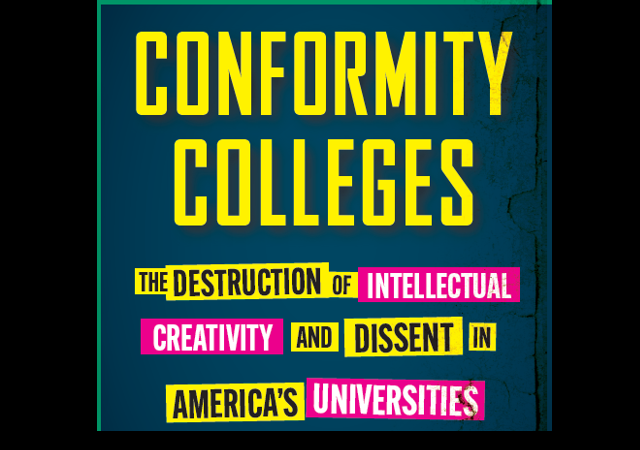Book Review: Conformity Colleges by David R. Barnhizer
The Destruction of Intellectual Creativity and Dissent in America’s Universities

The Covid era may be remembered best for exposing how woke activists have captured our universities ideologically. However, the ensnaring of our colleges has been a continuing process that spanned decades.
This premise is in the introduction to the new book by David R. Barnhizer (Professor of Law Emeritus at Cleveland State University), Conformity Colleges: The Destruction of Intellectual Creativity and Dissent in America’s Universities. Conformity Colleges is an engaging analysis of the experiences of men and women who have tried to engage in honest debate and utilize their free speech to nurture the minds and promote critical thinking in young men and women who are thwarted by dogma and an environment that is exceptionally hostile to personal liberty.
One of the early chapters is devoted to Marshall McLuhan, a Canadian philosopher whose work is among the cornerstones of the study of media theory. He is best known for his insight that “the medium is the message.” Conformity Colleges focus on the power to use the university as an overarching “medium” that creates the illusion of legitimacy to flawed and poisonous dogma, such as Diversity-Equity-Inclusion (DEI), Environmental, Social, and Governance (ESG), and Critical Race Theory (CRT).
Barnhizer succinctly and engagingly provides examples highlighting the nature and impact of the ideological creep that has essentially become a landslide. He quotes the work of many educators and pundits, including several I have written about (e.g., Stanford Professor Dr. Jay Bhattacharya, geologist and climate analyst Dr. Matthew Wielicki).
I must admit, though, that my favorite quotes come from Professor William Jacobson.
Linguist Ruth Nanda Anshen offers a vital insight in explaining that humans do not only “use” language but “become” the language they use, even to the extent it defines their identity and sets limits on their ability to perceive and interpret reality. She explains: “man is that being on earth who does not have language. Man is language.”6 When this occurs, particularly with activist collectives, “their” language becomes “their” personal reality, one they zealously seek to impose on the “unenlightened masses.” Nicholas Land offers the insight of William Jacobson on this issue.
Cornell Law Professor William A. Jacobson warned that colleges and universities are “manifesting authoritarianism” by removing “problematic” words and firing staff that don’t abide by left-wing ideologies. Jacobson said he believes the increase in stories about word-banning on college campuses is a manifestation of what is referred to as “repressive tolerance,” wherein tolerance serves to preserve a repressive society by neutralizing opposition to impose forms of authoritarianism. “They monitor your language, they get you to use language that only they approve, and once you’ve done that with somebody, once you’ve done that with a campus, that’s enormous control,” he said.
This may seem subtle, but it represents why the Woke/CRT movement has been continually inventing new language and defining what they consider “correct” contexts for the use of existing language we are supposedly obligated to use.
Barnhizer’s book brilliantly describes how woke activists are still working to change the university systems to entrench themselves even further. For example, tenure track positions are being replaced by term-specific contracts, making educators more vulnerable threats and less likely to challenge narratives.
And, as I began this review with the pandemic, I will conclude with another reference to a pandemic: The pandemic of silence, proposed by a rapper named Zuby.
“Over the past 10 years, we have had this pandemic of cowardice, and people are unwilling to say things in many cases that are objectively true.
They are afraid of repercussions,” he said, adding that cowardice and courage are both habits and they’re also both contagious. When people start acting like cowards, it can affect others around who will start behaving like cowards, Zuby said.
“When one person stands up, starts speaking out, and using their platform to either state their opinions or to state objective facts, it encourages other people to do the same.
Barnhizer loves education, and that passion comes across on every page of Conformity Colleges. His book should be in the library of anyone who wants to understand the current state of American universities and precisely how they have strayed so far from their goals and missions.
I give the book five stars out of 5. And while it would be a great holiday gift for those struggling with woke universities or young men and women contemplating what colleges they should attend, it won’t officially be out until January. But you can pre-order and place a note among chocolates, a wine basket (or both).
Donations tax deductible
to the full extent allowed by law.








Comments
“Conformity Colleges focus on the power to use the university as an overarching “medium” that creates the illusion of legitimacy to flawed and poisonous dogma”
Reminiscent of how, 55 years ago, every student on campus wore bluejeans to signify that they were “nonconformist” — to the point where students who did not wear bluejeans were viewed as suspect. I did not wear my first bluejean until I was in my 30s. (When I did wear work denim, it was brown.)
Today I am happily wearing bluejeans preparatory to today’s task of mucking two weeks of horseshit out of the corral…. a task much less daunting than cleaning 20 years of it out of an institution of higher learning.
Grow up.
Accept reality.
These really are not healthy places.
You do not have to buy what they are selling.
It may be worse than Barnhizer realizes.
To wit—Harvard now has a course about Taylor Swift:
https://blogger.googleusercontent.com/img/b/R29vZ2xl/AVvXsEgMFNdIzieDTP3vTP0zmaxMSS7Lf6uWAEzy6LTpF8sXgcR05c0KFYkLMSOMmBb_wcmf5hEPUX536FddKasnlU7iQ9Q6DNArHgfCvC6OHAfEq0l94QtHa1qlWPxUrjKbxz5X1gC8ecuE9OY20z4PnLtm2vOImCcslWc8PmcaHjs6micdwJx4iENalDaDLNWI/s1311/909.jpeg
Good job, guys.